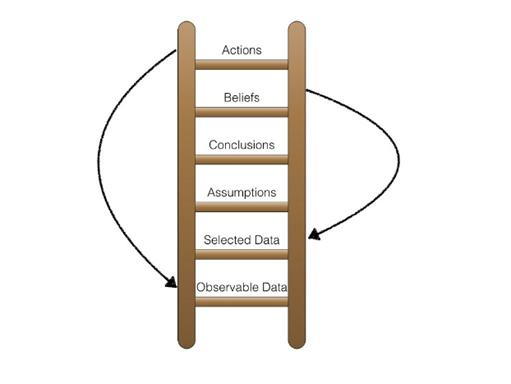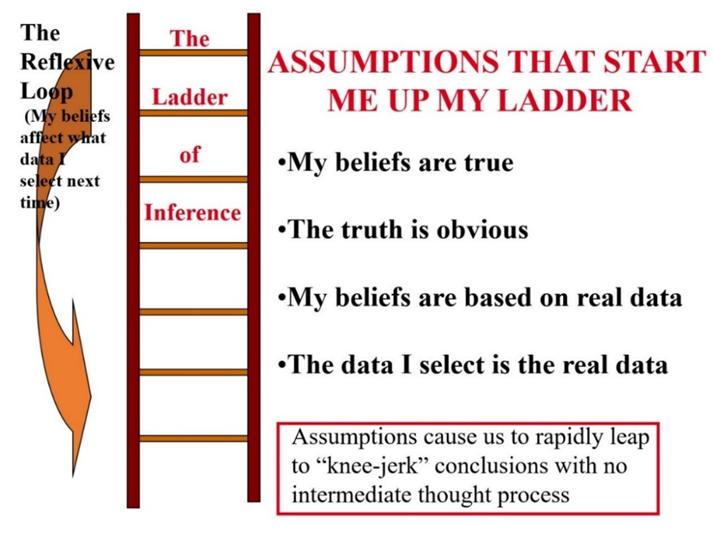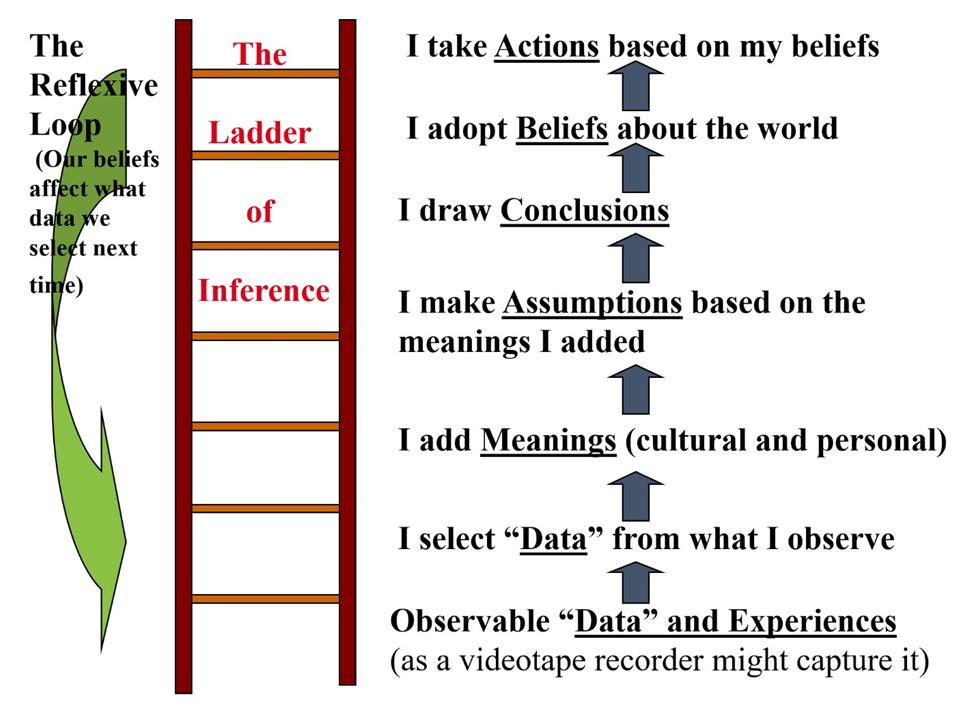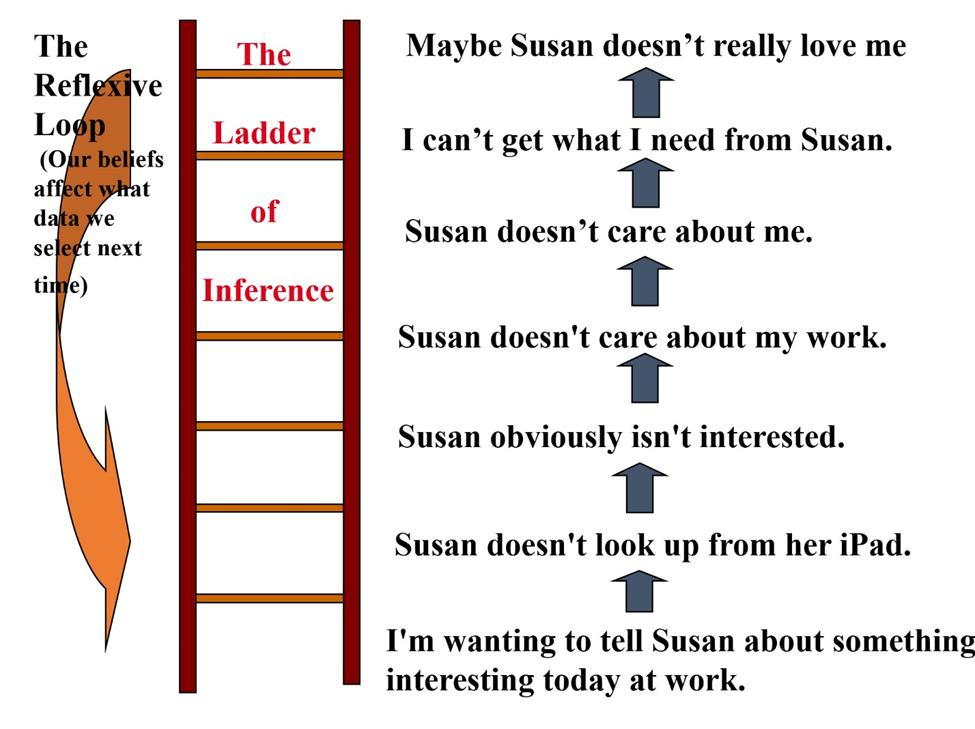Ladders of Inference
By Dr. Bill
Have you noticed that you feel totally loved and loving one moment, and completely caught up in fight, flight, freeze, or appease modes the next? Or you may have noticed that a loving partner may angrily want nothing more to do with you within five minutes of wanting closeness.
When you are new to a love relationship, everything seems perfect. It’s hard to imagine being cruel to your partner, or that your partner could be insensitive, and perhaps even mean-spirited.
In the beginning, all is wonderful! You may both have the illusion of being in the perfect relationship. You seem so much alike, and you don’t argue. You haven’t yet discovered that you differ in significant ways. The joy of new love obscures these differences. Your differences seem unimportant and anyway, love conquers all! Doesn’t it?
The reality is that everything changes, including your perception of the “perfect” relationship. Ultimately, you will discover that you can disagree, and in fact, can have heated exchanges. It’s often a shock when the bliss of romantic attraction and romantic love gives way to an inevitable power struggle. You may feel betrayed, as if your partner has deceived you. How can it be that you can have such difficulty coming together on certain issues? How can it be that your partner just doesn’t get it, doesn’t fully understand your needs or feelings?
You may find yourself in the heat of the moment having very unkind and unloving thoughts and feelings. And your usually loving partner can be angry, distant, and even rejecting. What happened? Where did it go wrong, and what does this mean for the future of the relationship? Insecurities and protections are fueled. Emotional pain is intensified.
We will find answers in social psychology, attachment science, and evolutionary psychology. Our brains are wired for attachment, but also wired for defending, aggression and anger. A concept we’ve found useful in describing how we humans can quickly shift from loving connection to emotional upset and distance is the concept of “ladders of inference.” It iswhat you observe and how you process your observations.
As your relationship evolves, you pay more attention to the “little things,” things that didn’t seem so important early in your relationship. Instead of being on your best behavior, you may become more open about thoughts and feelings that run counter to the joyous harmony you experienced in a new relationship. You discover your partner can be annoying and disagreeable. You reinterpret your partner’s behaviors and use labels like difficult, stubborn, uncaring, lazy, weird, or even crazy.
A constant stream of data would hopelessly overwhelm our brains if we weren’t able to categorize information, relate data to previous experience, infer meaning, make assumptions and draw conclusions,–and add labels. This is how we think and while often useful, this processing of our experience can sometimes get us into trouble as we work our way up our ladders.

Figure 1: Ladder of Inference
The following are key assumptions that get you started up your “ladder of inference”

Figure 2: Ladder of Inference Assumptions
This concept has relevance for all human relationships, both personal and on-the-job. All of us humans mis-communicate, misunderstand, and misperceive. Communication is complex, and communication under pressure or when faced with a threat requires unusual skill. The best communicators among us get it wrong–and not infrequently.
You perceive what’s going on in your own unique way, and more often than you would probably like to admit, you get it wrong. Being human, you, like all the rest of us, have a tendency to deny, distort, and falsify reality, particularly when experiencing powerful emotions. What you communicate to your partner, and what your partner communicates to you, might be quite confusing. You might recognize yourself in the following:
Your Meanings (a song, author unknown)
You put your meanings in my words
Till my words don't mean what they say
I don't mean you hear just what you want to hear
No, you hear what you think I would say
And when some of your meanings hurt you
Then you get angry at me
And I put my meaning in your bitter tears
And I hate you for hurting at me
But I only wanted you to know me
To see me and hear me as I feel me inside
Laughing easy, crying hard, seldom certain,
always wishing we could fly
But you put your meaning in my words
While my meanings stumble and fall
Our lips are still moving, there is sound in the air
But I don't think we’re talking at all
Communication between two people may seem on the surface to be straightforward and uncomplicated, but nothing could be further from the truth. Unless you are quite good at what we call “mindful relating,” there is plenty of opportunity for your communication to be derailed.
Interpersonal problems increase exponentially with powerful emotion. In fact, when you are in fight-flight-freeze-appease mode, you’ve lost a lot of IQ points, and your responses are probably not fully rational and objective. Your wolf may have been unleashed.
As you can see by the following chart, when we are threatened we step-by-step work our way up our ladder, predisposed to acting upon long-standing beliefs, often leaping to “knee-jerk” conclusions, and clinging to assumptions based on limited evidence. We add Meanings based upon data we are pre-programmed to pay attention to. Once up your ladder, the “reflexive loop” or feedback loop determines what data you will be select to support beliefs you already hold.

Figure 3: Ladder of Inference Step-by-Step
We’ve all been there. The conversation starts normally, like most conversations. At some point, you or your partner are “triggered.” Emotions such as fear or anger are generated, and increasingly, your emotions are managing you rather than you managing your emotions. You are moving up your ladder.
The following is an example of a hypothetical exchange with Susan. Remember that there is no such thing as a perfect partner and your partner will often disappoint you. In fact, whoever you’re with can sometimes be irritating or annoying. No big deal! However, being human, it’s in your nature, in fact in all of our natures, to add meaning to your partner’s actions, and ultimately you behave accordingly, working your way up your “ladder of inference”

Figure 4: Ladder of Inference Example
So Susan might otherwise be quite loving and attentive. However, like many of us she is addicted to technology. Observing her with her iPad is nothing more than taking in data, but our human brains can’t leave it at that. We add meaning. We tell ourselves stories. We work our way up our ladders, and when we’re at the top of our ladder, we will find the evidence to support our beliefs and behaviors via the reflexive loop. We may feel quite secure in the relationship one moment, and the next moment be convinced the other person is not to be trusted and may even have evil intent. It’s very human. We all do it. You too?
Let’s join a hypothetical couple, Matt and Beverly.
“It’s not that we don’t love each other,” said Matt. “It’s just that we have moments when it seems like the love is gone. Those are really difficult times for me, and I’m sure I contribute my fair share of the problem. Sometimes I find myself acting mean and sounding really hateful. It’s not how I want to be, but it seems to keep happening.”
Beverly had been listening as they drove back from dinner at their favorite Italian restaurant. The food had been great as usual and conversation until now had been light and fun. She hoped now that the conversation had taken a serious turn it wouldn’t erupt into another episode of blaming and defending. Each time the subject was about the relationship, she expected the worst. Well, so far so good she thought. Maybe this can be productive. She took a deep breath and said: “Yes, I know we love each other, but our fights seem to come out of nowhere, and I hate them. When they are happening I’m sure it’s all your fault, but when things cool down, I know it’s just as much me.”
“Yeah, that’s how it goes. We both get to blaming each other.” Matt was determined to get beyond the fights. He continued: “No one ever wins. I guess in a relationship there is no such thing as win-lose. We either win together, or we both lose, and with these fights we both seem to lose a lot. In fact, not only do we both lose each time, but it’s happening more and more and I’m afraid our relationship is getting damaged. How can we do this differently?”
With Matt’s last question, the conversation has become infused with opportunities for positive change. There is a name for communication about communication. It’s “meta-communication,” and a primary characteristic of high-functioning couples. In fact, all couples need to have conversations about their relationship–but to have them without blaming or attacking, and without defending or withdrawing.
Matt was asking the right question: “How can we do this differently?” Part of the solution is learning that there are aspects of our nature that make being in relationship about the most complicated and difficult thing we do.
The concept of "ladders of inference" is extremely useful and we find couples who have learned the concept are entering a very productive conversation as they examine their assumptions and work their way down their ladders. In the process, couples can discover problems they didn't know existed. For example, Beverly’s comment: “When they are happening, I’m sure it’s all your fault,” illustrates a related key concept, The Fundamental Attribution Error, but that’s a topic for another blog post.